Filter by
Emerging Techniques in Applied Demography
By bringing together top-notch demographers, sociologists, economists, statisticians and public health specialists from Asia, Africa, Europe, and North America to examine a wide variety of public and private issues in applied demography, this book spans a wide range of topics. It evaluates population estimates and projections against actual census counts and suggests further improvement of esti…
- Edition
- 1
- ISBN/ISSN
- 978-94-017-8990-5
- Collation
- 36 b/w illustrations, 54 illustrations in colour
- Series Title
- -
- Call Number
- -
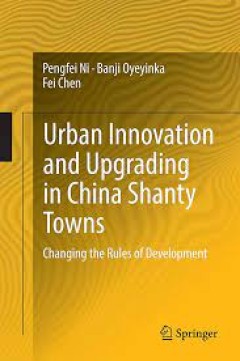
Urban Innovation and Upgrading in China Shanty Towns Changing the Rules of D…
By using field survey and World Bank investment project evaluation method, this book investigates the experience of slum rebuilding in Liaoning province, China. It figures out that the experience of Liaoning province is relatively successful and can be of great significance for developing countries and regions. The issue of slums is a huge challenge in the process of global urbanization. The po…
- Edition
- -
- ISBN/ISSN
- 978-3-662-43905-0
- Collation
- -
- Series Title
- -
- Call Number
- -
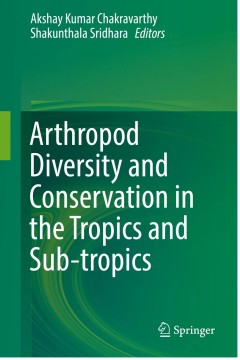
Arthropod Diversity and Conservation in the Tropics and Sub-tropics
Arthropods are invertebrates that constitute over 90% of the animal kingdom, and their bio-ecology is closely linked with global functioning and survival. Arthropods play an important role in maintaining the health of ecosystems, provide livelihoods and nutrition to human communities, and are important indicators of environmental change. Yet the population trends of several arthropods specie…
- Edition
- Ed. 1
- ISBN/ISSN
- 978-981-10-1518-2
- Collation
- XXIV, 435
- Series Title
- -
- Call Number
- 304.2 ART a
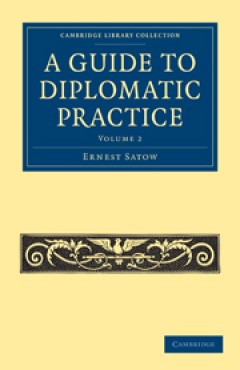
A Guide to Diplomatic Practice
Recruited straight from university, Ernest Satow (1843–1929) became one of the most respected British diplomats, particularly in Japan, where he is still remembered. After a career spent mostly in the rapidly developing Far East, he retired in 1906. Just before the outbreak of war, he was asked to compile a work on international diplomacy, and 'Satow', as it has become known, was first publis…
- Edition
- -
- ISBN/ISSN
- 9780511995200
- Collation
- -
- Series Title
- Cambridge Library Collection - British and Irish History, General
- Call Number
- -
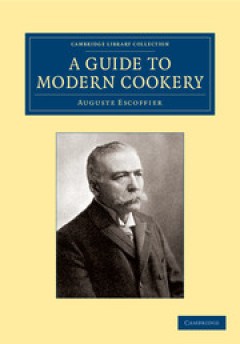
A Guide to Modern Cookery
The late nineteenth and early twentieth centuries witnessed a revolution in the eating habits of European households with disposable incomes. Central to the culinary history of the period is the innovative French chef Georges Auguste Escoffier (1846–1935). His cooking methods, combined with a modern approach to managing professional kitchen staff, contributed to the development of a fashionab…
- Edition
- -
- ISBN/ISSN
- 9781139626637
- Collation
- -
- Series Title
- Cambridge Library Collection - European History
- Call Number
- -

Political Preferences and the Aging of Populations; Political-Economy Explana…
Oliver Pamp analyzes the likelihood and extent of pension reforms from a political-economy perspective. It is shown that voters’ preferences for or against reforms are influenced by a societies’ demographic development, the generosity of its existing public pension scheme and its electoral system. The author extensively reviews existing formal models of pension systems, discusses their meri…
- Edition
- 1
- ISBN/ISSN
- 978-3-658-08615-2
- Collation
- XXIV, 188
- Series Title
- -
- Call Number
- 612.67 PAM p
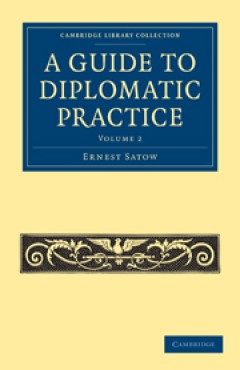
A Guide to Diplomatic Practice
Recruited straight from university, Ernest Satow (1843–1929) became one of the most respected British diplomats, particularly in Japan, where he is still remembered. After a career spent mostly in the rapidly developing Far East, he retired in 1906. Just before the outbreak of war, he was asked to compile a work on international diplomacy, and 'Satow', as it has become known, was first publis…
- Edition
- -
- ISBN/ISSN
- 9780511995194
- Collation
- -
- Series Title
- Cambridge Library Collection - British and Irish History, General
- Call Number
- -

A Geographical Survey of Africa Its Rivers, Lakes, Mountains, Productions, S…
James MacQueen (1778–1870) was a British geographer and also one of the most outspoken critics of the methods of the British anti-slavery campaign in the 1820s and 1830s. Although he never visited Africa, he became an acknowledged expert on the continent, through reading all available accounts, ancient and modern, as well as interviewing slave merchants while managing a sugar plantation in th…
- Edition
- -
- ISBN/ISSN
- 9781139034562
- Collation
- -
- Series Title
- Cambridge Library Collection - African Studies
- Call Number
- -

A Geographical and Commercial View of Northern Central Africa
James MacQueen (1778–1870) was a British geographer fascinated by the problem of the River Niger. He set out to try to establish (on the basis of accounts by explorers, traders and missionaries), that one and the same river flowed continuously through Africa and into the Atlantic Ocean, thus challenging long-established beliefs that African rivers either disappeared into the sand or terminate…
- Edition
- -
- ISBN/ISSN
- 9781139034579
- Collation
- -
- Series Title
- Cambridge Library Collection - African Studies
- Call Number
- -
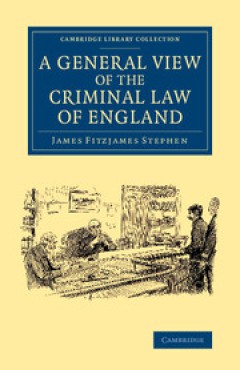
A Gentlewoman's Home The Whole Art of Building, Furnishing, and Beautifying …
Jane Ellen Panton (1847–1923) was the second daughter of the artist William Powell Frith, and an expert on domestic issues. First published in 1896, this is her guide to creating the 'dream house'. In it she draws on the experiences of Deborah and Dick, clients who sought her advice after looking unsuccessfully for a suitable home. The book is based on the notion that turning an existing buil…
- Edition
- -
- ISBN/ISSN
- 9781139381956
- Collation
- -
- Series Title
- Cambridge Library Collection - British and Irish History, 19th Century
- Call Number
- -
 Computer Science, Information & General Works
Computer Science, Information & General Works  Philosophy & Psychology
Philosophy & Psychology  Religion
Religion  Social Sciences
Social Sciences  Language
Language  Pure Science
Pure Science  Applied Sciences
Applied Sciences  Art & Recreation
Art & Recreation  Literature
Literature  History & Geography
History & Geography